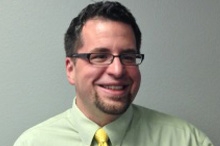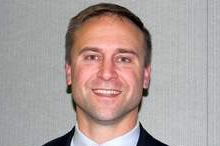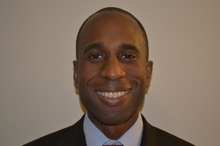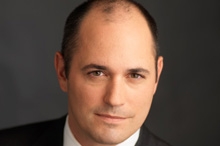Champions of Change Blog
Helping Teachers and Students Learn from Each Other
Posted by on November 26, 2013 at 5:03 PM EDT
Bud Hunt is being honored as a Connected Educator Champion of Change.
My journey as a connected educator started roughly nine years ago when I began blogging about my teaching practice. I wanted to learn how to be a better teacher and how to incorporate the Web’s global audience and voice for my classroom of underprivileged high school students.
Through the open Web, I rediscovered my passion for democratic education, exploration and wonder, the love of a good poem, and the right people to share it with. I regained the power of connection with others around shared activities and interests. I was able to sustain myself as a passionate learner and help foster connections between my students and others all over the country. What was new to me then, but is habit now, was the idea that somewhere out there was someone who could teach me something I wanted to know. The challenge was that I had to find them.
Later, I would learn that what I was discovering about the power of interest-driven and peer-supported learning would eventually be known by some as Connected Learning. My friends and colleagues at the National Writing Project and their network of local school-university partnerships that have been so essential to my professional development would call it inquiry-driven learning. Whatever words we use, my experiences are like so many others’ who have taken to the Web - we meet individuals who are similar and different from us, who will then help us to become better people.
When I left my own high school classroom to work with teachers and students in their classrooms, I noticed two distinct types of learners. There were folks who saw a problem and responded to it with, “I don’t know, but let’s figure it out,” and there were those who, when faced with a problem, just decided to quit. I came to realize that an essential job of any educator is to help people build the ability to solve problems on their own, and to tinker their way to better situations for themselves and others. That’s why I find myself more and more drawn to Maker communities, and to other projects and organizations that are helping to build capacity in others. That’s also why I’m curious about how to cross-pollinate school spaces with non-traditional spaces like makerspaces. We have a lot to learn from one another, and there are plenty of important ways that educators and non-educators (but still learners) need to be in connection and conversation.
Technology, is often seen as an addition to the learning experience. In the 21st century, in a time of Common Core State Standards, that is no longer the case. Change is hard. Doing right by our students and each other is hard. Playing with the newest toys is easy, and can feel like change. But is good instructional practices, like all good habits, take time and effort to develop. The work of connected educators then involves helping learners to make connections to good tools and habits, and to break connections to the bad ones.
I am honored to be named a Champion of Change. I stand on the shoulders of those who have come before me, namely my teachers, students, and colleagues who have helped me to better understand myself and be a better learner. Here’s to all those who work daily to ensure that our schools help us remember to be the best of ourselves, and to instill the values of democracy and public discourse that have been so essential to our growth and continued improvement as a nation.
Bud Hunt is an instructional technologist for the St. Vrain Valley School District in northern Colorado, where he helps teachers and students to thoughtfully apply technology to their interactions with the world and each other.
Learn more about EducationVideo: Veterans Advancing Clean Energy and Climate Security
Posted by on November 12, 2013 at 5:56 PM EDTEd. Note: This blog is cross-posted from the U.S. Department of Energy.
Last week, Secretary Moniz joined other federal officials in honoring veterans that are working in clean energy and climate security at a "Champions of Change" event at the White House. The event honored 12 veterans that are using the skills they learned while in the service to help secure our clean energy future.
Across the country, these veterans are making a difference in their communities, whether by launching new small businesses, advising large institutions on their energy efficiency strategies or providing education and training in renewable energy and energy efficiency to fellow veterans.
The video above features a few of these veterans:
- Joseph Kopser serves as the Co-Founder and CEO of RideScout, a startup smartphone app created to increase transportation efficiency by getting people out of their cars and into other public, commercial, and private options. A West Point and Harvard Kennedy School graduate, Joseph served in the United States Army for 20 years, retiring in 2013 as a lieutenant colonel.
- Andrea Marr is a commissioning engineer at McKinstry’s Irvine, California, office where she advises large institutions on energy efficiency strategies. She served as a gunnery officer on two deployments in support of Operation Iraqi Freedom and as a nuclear engineering officer during a third deployment.
- Elizabeth “Liz” Perez-Halperin is the President and Founder of GC Green Incorporated, a green building general contracting and consulting firm. Liz also served in the United States Navy for over eight years as an aviation logistics specialist. GC Green is involved in an effort to broaden the outreach and impact of the green economy.
Though these veterans have returned from active duty, their service to our nation continues here at home.
Watch our latest video featuring highlights from the Champions of Change: Veterans Advancing Clean Energy and Climate Security event and learn more about the Champions of Change program.
Ben Dotson is the Project Coordinator for Digital Reform in the Office of Public Affairs at the U.S. Department of Energy.
Learn more about Energy and EnvironmentEnergy Storage Technology is Critical for Developing Secure, Dependable Renewable Power
Posted by on November 5, 2013 at 12:20 PM EDT
Adam Cote is being honored as a Veteran Advancing Clean Energy and Climate Security Champion of Change.
On December 21, 2004, I was in the mess hall in Mosul, Iraq when a suicide bomber attacked, killing twenty-two and wounding another seventy-two. Lucky to have been behind a large refrigerator, I was uninjured. In the pandemonium that followed I organized the treatment and evacuation of casualties and personally cared for numerous fellow soldiers.
When I returned from Iraq, I applied these skills as a quick thinker and problem solver in complex situations front and center to my work in the energy sector.
My previous deployments to Bosnia and Iraq left me looking for ways to use my civilian career as an energy attorney to strengthen our economic and energy security here at home. Coming from Maine, a state with some of the highest home heating costs in the country – yet some of the most incredible renewable energy resources – I started looking for a way to connect the dots between economic and energy security. How could we start integrating locally generated renewable power to increase our state’s energy security and reduce heating costs for families?
In 2009, my business partners and I founded Thermal Energy Storage of Maine (TESM), a company dedicated to promoting the use of affordable, off-peak electric thermal storage technology as both an economical home heating solution for families and as a way to convert intermittently-generated renewable power into a stable, secure, and local source of power and heat. TESM promotes electric thermal storage (ETS) furnaces and room heaters, which consist of a super-insulated metal box with ceramic bricks and heating elements inside. At night an automatic timer opens a circuit and the heater charges, converting lower-cost, off-peak power into heat energy stored in the bricks for heating homes and businesses.
Today our company works with Central Maine Power Company, Dead River Company, Madison Electric Works, Houlton Water Company and others to offer Mainers affordable, off-peak electric heating solutions that provide home heating at the equivalent cost of $2.25 to 2.90 per gallon of home heating oil.
Integrating renewable power into the U.S. power grid will require widespread development of energy storage technologies. Today, plants using carbon-based resources, such as oil and natural gas, often maintain energy generation and load in a near-perfect equilibrium state. However, many renewable energy resources such as wind, solar, wave and tidal power can be intermittent and difficult to control to match load levels. Energy storage offers a flexible and controllable load that can be available to handle renewable power deliveries whenever they occur.
To use an Army colloquialism, energy storage is “good logistics” – it is a simple solution to a complex problem. If we encourage and incorporate storage technologies in a variety of forms, we will make our entire energy infrastructure more flexible, efficient and secure.
Our company is dedicated to promoting the use of energy storage, and we are proud to add our voice to those calling for storage technologies to be recognized as a key strategic infrastructure goal for our country.
Notification that I had been selected as a White House Champion of Change reached me at the Joint Forces Training Center at Camp Shelby, MS, where I was training with the Maine Army National Guard’s 133rd Engineering Battalion for our deployment to Afghanistan. Although not able to attend the White House event in person, I am humbled and honored to be selected.
Adam Cote is CEO and Co-Founder of Thermal Energy Storage of Maine and currently deployed as a Company Commander in the Maine Army National Guard 133rd Engineering Battalion’s Task Force Black Bear in Afghanistan.
Learn more about Energy and EnvironmentClean Energy and Climate Change Are American Issues
Posted by on November 5, 2013 at 12:18 PM EDT
Robin Eckstein is being honored as a Veteran Advancing Clean Energy and Climate Security Champion of Change.
In 2003 I deployed with the 1st Armored Division, 123rd Main Support Battalion to Baghdad, Iraq as a truck driver. In Iraq, I drove supply missions in and around the Baghdad area. During that time there was no opportunity to reflect on the daily missions to deliver fuel to forward operating bases that left our convoys vulnerable to constant attacks. These forward operating bases were going through so much fuel that the convoys had to leave the safer confines of the main bases and put American lives at risk so that this dirty fossil fuel could be used up almost as fast as it was delivered. I realized there had to be a better way, but during war you don’t have time to worry about the “what ifs.”
After returning home I decided to continue my service to the country by striving to make a difference in clean energy. In 2007 I began working on veterans issues with VoteVets.org. Then in 2009, the Truman National Security Project started a campaign called Operation Free, a coalition of veterans and national security agencies campaigning for comprehensive clean energy reform. This is where I found a true place I could make a difference and ease the pain of losing my chance to serve directly after being medically discharged from my combat disability.
I boarded a bus with a group of fellow veterans from around the nation and we drove across the country speaking at hundreds of different venues, each time discovering that when a group of veterans discussed clean energy and climate change, it was no longer a partisan issue, but one that everyone in America could be concerned about. Whether it was a meeting at the Minot, ND, Chamber of Commerce or a VFW hall in Berkeley, MI, people could see the connections.
Our message was amplified by the Pentagon’s move to take climate change seriously as a threat multiplier. The Department of Defense is taking the lead to help reduce that impact, because every solar generator that replaces a fuel-using one saves lives in a war by not having me or my fellow truck drivers dodging bullets to transport that fuel to forward operating bases.
Bringing a no-nonsense message to the American people from honest war veterans proved that minds and attitudes could be changed. There has been a lot of forward movement on climate change and clean energy in the country, and there is more good work being done today. I know the changes the military is making now will mean fewer convoys being attacked because of the old fuel-guzzling ways of yesteryear. Not only did my fellow veterans and I make a difference by bringing the connection and the truth to Americans across the nation, but I also helped myself by continuing my service to my country and giving myself a reason to not let my disability win. I am honored to be a Champion of Change and thankful to all my fellow veterans that also spread the message on that big blue bus and the many others who helped along the way.
Robin Eckstein is a veteran and a Truman Defense Council member living in Appleton, WI.
Learn more about Energy and EnvironmentA Future for All in Green Energy
Posted by on November 5, 2013 at 12:15 PM EDT
Phillip Green is being honored as a Veteran Advancing Clean Energy and Climate Security Champion of Change.
I am often commended by people for my courage to start Green Powered Technology (GPTech), a green energy business. I then think to myself that starting the business was not nearly as courageous as they imagined, since I initially maintained my day job. However, I think I displayed conviction in graduating from public schools in the Bronx on time, obtaining my college degrees on time as I served in the Army Reserve, researching green energy in Japan and China, and deploying to Afghanistan. All these endeavors were filled with pitfalls I overcame, so I am glad to be honored as a Champion of Change. I am also excited about the chance this recognition has given me to be a role model for others and a messenger for green technology’s many opportunities.
I started GPTech to fully utilize my education, government experience, and global interest in making the world more energy efficient. In 2004, my experience with light-emitting diode, which I researched in Japan, and their adoption challenges prompted me to learn more about technology adoption. After further experience with technology adoption, I felt confident I could form specialized teams to overcome hurdles in adopting green energy and make it easy for anyone to incorporate sustainable energy into their operations and communicate results to interested parties. My time in the U.S. Army and business school greatly assisted me with these team-building skills.
Towards the goal of making the world a more efficient place, GPTech pursued U.S. federal government contracts, since the U.S. government is the single largest energy-consuming entity in the world. Given this scale of consumption, GPTech’s offer to help save money, enhance operations, protect the environment, and provide energy reliability and security could have an especially large effect. I have also positioned my business to do work in Africa and China, because of their rising growth and energy needs.
GPTech provides experts to develop and implement strategies, initiatives, projects, and programs to help federal clients comply with the energy conservation and renewable energy requirements outlined in the Energy Policy Act of 2005, the Energy Independence and Security Act of 2007, Executive Order 13423, and Executive Order 13514.
In emerging markets, GPTech provides support to the U.S. Trade and Development Agency on proposal reviews and feasibility studies for renewable energy projects in the Power Africa Initiative. GPTech is also working on a USAID contract to promote clean energy in emerging markets.
Green energy allows us to improve our communities and our national, economic, and environmental security. The Department of Defense (DoD) risks lives to secure energy by protecting convoys that deliver fossil fuels and securing open sea lanes for oil tankers. Emerging markets require energy for economic growth, but they are not necessarily employing the best energy practices. GPTech envisions better solutions for DoD, emerging markets, and the world by sharing best energy practices, energy efficiency measures, and renewable energy sources.
Green energy presents challenges, which I view as opportunities on both the supply and demand sides. Additionally, green energy requires U.S. students to embrace and find employment in science, technology, engineering, and mathematics fields and eventually find our future energy solutions.
Fortunately, there are researchers working on green energy challenges and companies promoting innovative green energy business models across the globe. The greening of the supply chain presents additional opportunities. In other realms, providing solutions around the nexus of energy, water, and food will continue to present challenges for society and opportunities for entrepreneurs.
Phillip Green is the founder and president of Green Powered Technology, a firm that provides expert advice to our clients on energy and the environment.
Learn more about Energy and EnvironmentSolar Power is a Force Multiplier for Us All
Posted by on November 5, 2013 at 12:13 PM EDT
Nat Kreamer is being honored as a Veteran Advancing Clean Energy and Climate Security Champion of Change.
Tracer rounds from 50-caliber machine guns lit up the sky the night I landed at Baghdad International Airport. Like hundreds of thousands of Americans over three decades, I was in the Middle East, in uniform, carrying a gun to protect our national energy interests. A little over a year later I took off from Bagram Airfield, returned home, and co-founded SunRun to help American homeowners get their energy from clean, affordable, and domestic solar power. There’s nothing like a war with natural resource implications to kick-start passion and faith for renewable energy.
Our lifestyles cannot continue to subsidize foreign energy sources with more blood and more treasure. American soldiers, sailors, airmen, and Marines have and continue to make tremendous personal sacrifices to protect our national energy interests around the world. We have spent at least $7.3 trillion to defend our energy interests in the Persian Gulf alone over the last thirty years, according to research by Princeton University professor Robert J. Stern. To put this in perspective, $7.3 trillion equals approximately $23,000 per U.S. citizen. Imagine the last thirty years without two wars in the Gulf, with a healthier economy, and with a cleaner environment.
We owe our veterans and fellow citizens a way of life powered by clean, affordable, and domestic energy sources like solar. Fortunately, we are making progress. In the first three months of this year 82 percent of all new power generators built in the United States came from renewable energy sources. Every month around 10,000 Americans buy hybrid or electric cars. Every four minutes another solar system powers on in America. In many states a household can buy solar electricity for less than its current utility bill. A car that runs on solar is half as expensive to operate as one running on gasoline. Those simple home economics mean we may not have to spend the next thirty years fighting debt-financed foreign wars.
Our military is leading from the front. The military is putting solar electricity systems on the roofs of base buildings around the country. That solar electricity saves the military money it can invest in our national defense, and installing distributed solar electricity systems on military bases improves their defense by helping make bases self-sustaining and harder to attack.
U.S. military units in the field are starting to use solar panels to generate electricity to run combat systems. Those solar panels make our fighting units more effective by reducing their reliance on vulnerable supply chains and expensive over-land diesel fuel deliveries for generators. According to the U.S. Marine Corps Expeditionary Energy Office, it costs the U.S. military approximately $50 per gallon for every gallon of diesel delivered to combat units in the field. An average solar panel costs approximately $150, creates as much energy as approximately 250 gallons of diesel fuel, and only has to be delivered once. Solar power is a force multiplier for us all.
Nat Kreamer served as a US Navy officer and in the US Special Forces in Afghanistan, where he was awarded the Bronze Star. Today he is the President and CEO of Clean Power Finance, and the Vice Chairman of the Board of Directors of the Solar Energy Industry Association.
Learn more about Energy and Environment
- &lsaquo previous
- …
- 34
- 35
- 36
- 37
- 38
- 39
- 40
- 41
- 42
- …
- next &rsaquo
White House Blogs
- The White House Blog
- Middle Class Task Force
- Council of Economic Advisers
- Council on Environmental Quality
- Council on Women and Girls
- Office of Intergovernmental Affairs
- Office of Management and Budget
- Office of Public Engagement
- Office of Science & Tech Policy
- Office of Urban Affairs
- Open Government
- Faith and Neighborhood Partnerships
- Social Innovation and Civic Participation
- US Trade Representative
- Office National Drug Control Policy
categories
- AIDS Policy
- Alaska
- Blueprint for an America Built to Last
- Budget
- Civil Rights
- Defense
- Disabilities
- Economy
- Education
- Energy and Environment
- Equal Pay
- Ethics
- Faith Based
- Fiscal Responsibility
- Foreign Policy
- Grab Bag
- Health Care
- Homeland Security
- Immigration
- Innovation Fellows
- Inside the White House
- Middle Class Security
- Open Government
- Poverty
- Rural
- Seniors and Social Security
- Service
- Social Innovation
- State of the Union
- Taxes
- Technology
- Urban Policy
- Veterans
- Violence Prevention
- White House Internships
- Women
- Working Families
- Additional Issues

